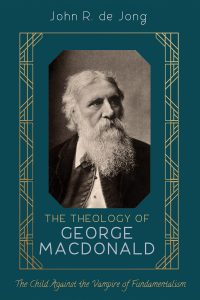
I am please to announce that my new book—The Theology of George MacDonald: The Child Against the Vampire of Fundamentalism—is now available. You can preview it here at Pickwick Publications or click here for the Amazon listing. If you are interested in the story of how it came to be written, read on.
In the old days when I was an aspiring hippie (my kids think it was just after the war, but it was a bit later) and I looked like a curly-haired version of my hero, Larry Norman, my then girlfriend (thankfully now my wife) gave me a volume containing MacDonald’s Phantastes and his erotic, gothic, vampire fantasy Lilith. MacDonald, at that time, was unknown to me and his purple and prolix Victorian style left me feeling somewhat bemused. I cannot claim (unlike C. S. Lewis) that it changed my life.
But some seed of a thought must have stayed with me, for some decades later I came across a copy of William Raeper’s biography in a second-hand bookshop and was strangely drawn to it. Daniel Hardy in the remarkable book Wording a Radiance remarks that the Holy Spirit is always drawing us from the known towards the becoming in a cognitive process which he (after the American philosopher C. S. Peirce) called ‘abduction’. I often feel that it is dangerous to pray in bookshops—you never know what journey might unfold in front of you. In this case (looking back), I can see that I was ‘abducted’.
But I must tell you about a prior, curious experience. In the mid-nineties, finding myself with some time on my hands in the library of Fuller Theological Seminary in Pasadena, I wandered into the basement, the ‘mystical’ section, curious as to what I might find. I pulled down a volume, MacDonald’s The Diary of an Old Soul—a collection of poems, one for each day of the year. Turning to January the 27th and 28th, I read the following extraordinary sonnets:
Yestereve, Death came, and knocked at my thin door,
I from the window looked: the thing I saw,
The shape uncouth, I had not seen before.
I was disturbed—with fear, in sooth, not awe;
Whereof ashamed, I instantly did rouse
My will to seek thee—only to fear the more;
Alas! I could not find thee in the house.I was like Peter when he began to sink.
To thee a new prayer therefore I have got—
That, when death comes in earnest to my door,
Thou wouldst thyself go, when the latch doth clink,
And lead him to my room, up to my cot;
Then hold thy child’s hand, hold and leave him not,
Till Death has done with him for evermore.
By the time I was reading the final line, I was weeping. There was something about the poignancy and honesty of those words that touched me deeply. The curious thing I found out later during my research was that those words were probably written in my then hometown of Bolton in the north of England as MacDonald faced what he thought were his final hours on this earth. As the narrator remarks in MacDonald’s novel Wilfrid Cumbermede:
I do not believe we notice the half of the coincidences that float past us on the stream of events. Things which would fill us with astonishment, and probably with foreboding, look us in the face and pass us by, and we know nothing of them.
Or, as Boris Pasternak put it:
When a great moment knocks on the door of your life, it is often no louder than the beating of your heart, and it is very easy to miss it.
So finding myself, some ten years later, questioning much of the received religious wisdom I had grown up with, my future PhD supervisor at King’s College London, Professor Ben Quash, suggested that MacDonald might be a useful research focus. It turned out to be another ‘great moment’ knocking on the door of my life. There is a certain irony that the puzzling volume Lilith, that I was given decades ago, became one of the central texts of my research, a narrative that names the vampire who, according to MacDonald, had taken residence at the heart of contemporary religion—an idol sucking the blood of children instead of offering them Eucharistic life.
I discovered that far from being theologically anachronistic, MacDonald’s perceptive critique of the church of his day speaks volumes to today’s worrying alliance between right-wing politics and a power-hungry Evangelicalism. I hope you enjoy the read!
